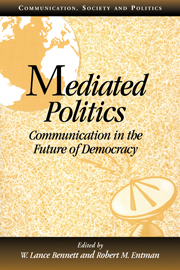Book contents
- Frontmatter
- Contents
- List of Figures
- List of Tables
- Contributors
- Preface
- Acknowledgments
- 1 Mediated Politics: An Introduction
- Part 1 Democracy and the Public Sphere
- Part 2 Citizens, Consumers, and Media in Transition
- Part 3 Mediated Political Information and Public Opinion
- Part 4 Mediated Campaigns
- Part 5 Citizens: Present and Future
- 19 Citizen Discourse and Political Participation: A Survey
- 20 Adapting Political News to the Needs of Twenty-First Century Americans
- 21 National Identities and the Future of Democracy
- 22 Communication in the Future of Democracy: A Conclusion
- Index
22 - Communication in the Future of Democracy: A Conclusion
Published online by Cambridge University Press: 05 June 2012
- Frontmatter
- Contents
- List of Figures
- List of Tables
- Contributors
- Preface
- Acknowledgments
- 1 Mediated Politics: An Introduction
- Part 1 Democracy and the Public Sphere
- Part 2 Citizens, Consumers, and Media in Transition
- Part 3 Mediated Political Information and Public Opinion
- Part 4 Mediated Campaigns
- Part 5 Citizens: Present and Future
- 19 Citizen Discourse and Political Participation: A Survey
- 20 Adapting Political News to the Needs of Twenty-First Century Americans
- 21 National Identities and the Future of Democracy
- 22 Communication in the Future of Democracy: A Conclusion
- Index
Summary
This book covers considerable ground, raising a variety of empirical and theoretical issues and employing diverse methodological orientations. We have not built a single story here, as different authors read the trends and possibilities in sometimes conflicting ways.What unites the chapters is their fundamental concern with the present and future of democratic political systems in which mass communication and newer communication techniques and technologies play important roles in the exertion of power and distribution of values. In this conclusion we summarize some key themes and issues and lay out directions for future research. First, we suggest a framework for organizing different understandings about the role of communication both as it affects the overall quality of public life and as it shapes citizen engagement in the specific policy decisions in democracies.
A SIMPLE MODEL OF COMMUNICATION IN DEMOCRACIES
From Aristotle's analysis of rhetoric, to Mill's designs for a marketplace of ideas, to Habermas's idealization of the public sphere and Dahl's comparative theory of polyarchy, theorists of democracy have concerned themselves with the delivery, distribution, quality, and uses of information by citizens. We propose here a brief adaptation of Dahl's (1989) account of polyarchy to identify and develop theoretically grounded research into some of the crucial issues emerging from political communication trends apparent at the end of the century.
Dahl argues that democracy in the ideal is defined by the equally empowered rule by all. Even if everyone is unlikely to participate in all decisions, no citizen in a fully evolved democracy is excluded from doing so based on restrictive participation requirements or discouraging burdens for becoming informed and expressing effective preferences.
- Type
- Chapter
- Information
- Mediated PoliticsCommunication in the Future of Democracy, pp. 468 - 480Publisher: Cambridge University PressPrint publication year: 2000



